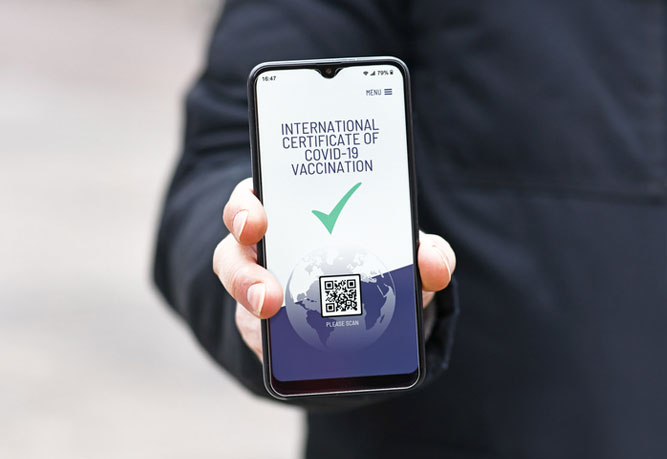Now that COVID-19 vaccines are available, holding the potential to minimize risk and concerns around contracting the virus, many are holding hope for a return to a semblance of normalcy.
That’s particularly true for organizations around the country that have had to deal with a shifting and often a hybrid approach to whether or not employees will be physically present in the workplace.
As employers begin calling employees back to the workplace, one question looms for many: should they require employees to be vaccinated, and can they?
While many employers are familiar with HIPAA which protects employee health information, not all understand clearly when—and where—it does and doesn’t apply.
HIPAA Applies to Healthcare Organizations
While their questions and concerns may create consternation, most organizations can rest assured that HIPAA considerations don’t impact them, says Andrew Rozo, an attorney in New York practicing healthcare law.
HIPAA, Rozo says, “only applies to healthcare professionals and their affiliates. Most HR professionals do not need to worry about that law. They can safely ask for health information.” The law, Rozo explains, was designed to prevent healthcare professionals from sharing patient information. However, he adds, this can become more complicated when the employer is also a healthcare provider.
“Simply asking for information does not violate HIPAA,” Rozo says. “Disclosing or using information without permission and unlawfully is the violation. Administrative walls can be put in place to ensure that the employee is the one voluntarily disclosing their health information. This way, HIPAA is not violated.”
In addition, he points out, when it comes to other COVID-19 information, “some things must be disclosed by the employee when it comes to the new benefits and family leave laws.”
Aside from HIPAA, though, there are some additional considerations employers should be aware of, says healthcare attorney Heather Macre who leads the healthcare practice group at Fennemore. If a vaccine is provided as part of a HIPAA-covered health plan or wellness program, says Macre, “employees should be asked to sign a HIPAA authorization permitting the health plan to notify the employer of the date, type, and fact of the vaccine’s administration.”
However, she says, if the vaccine is offered not as part of a health plan, but as workplace safety or public health measure for all employees—whether they participate in the health plan or not—HIPAA would not apply. Why? Because the employer would be acting solely in the capacity as an employer, she says. Still, she says: “Even if HIPAA does not apply to an employer’s COVID-19 vaccine program, HIPAA may apply to the vaccination provider itself, thus necessitating a HIPAA authorization for disclosure to the employer.”
Aside from HIPAA, there are EEOC concerns employers need to be aware of.
EEOC Implications Related to COVID-19
Employers obviously have legitimate concerns about the health status of employees who may pose a risk to others. The EEOC recognizes this and indicates that employers can inquire about employee vaccine status if their concern is “job-related and consistent with business necessity,” says Macre. There are EEOC concerns, though, with this line of inquiry that apply across the board, she says.
To meet the job-relatedness standard employers must establish that the worker’s failure to be vaccinated would post a “direct threat” to the well-being of that employee or others the employee has contact with as part of their job duties, says Macre. “Language elsewhere in the EEOC pandemic guidance suggests that an employer should be able to establish that direct threat standard if the employee has significant contact with other workers or third parties, or the public as part of performing duties.”
But, she adds, employers need to meet certain requirements to seek this information because those inquiries can cross the line into disability inquiries.
“Employers need to be mindful that, under Title VII of the Civil Rights Act of 1964, employers are required to provide reasonable accommodations to employees whose sincerely held religious beliefs prevent them from getting a vaccine,” says Macre. In addition, she points to the Americans with Disabilities Act (ADA), which requires employers to provide reasonable accommodations to employees who have an underlying disability that prevents them from being vaccinated.
Employers must also ensure that any of this information is kept secure and that it is separate from other portions of the employment file.
Assuaging Employee Vaccination Concerns
Employers may feel that they walk a fine line between protecting employee safety and ensuring their privacy. It’s not just a medical issue, says Alison Pearson, the head of HR at Hal Waldman and Associates in Pittsburgh. It’s a culture and employee engagement issue.
Pearson says she hasn’t yet received questions related to the firm’s desire to know who has, or hasn’t, been vaccinated. But, she says: “that doesn’t mean I haven’t put extensive thought into it.” She says that, if she should receive a question from an employee related to vaccine issues and their privacy that she will refer to an excerpt she found on the U.S. Health and Human Services site: “The HIPAA Privacy Rule protects the privacy of patients’ health information (protected health information) but is balanced to ensure that appropriate uses and disclosures of the information still may be made when necessary to treat a patient, to protect the nation’s public health, and for other critical purposes.”
Pearson adds that she won’t just fall back on that excerpt and “call it a day,” though. “The number one rule in human resources is to make employees feel heard,” she says. “I will first explain that I understand their frustration and their desire to remain private. However, as a firm and community, but is our duty to protect our team and clients’ health and it is difficult to do that if we don’t understand the risk.” Knowing who is and who isn’t vaccinated, she says, is one of the best ways to analyze that risk.
Pearson is not alone in her approach. Recent research indicates that most employers say they are unlikely to mandate vaccinations, in large degree to concerns about maintaining company culture and positive employee relations.
Most Employers Unlikely to Mandate Vaccinations
While many employers will encourage employees to get the vaccine, most do not plan to require it, according to a survey published by Fisher Phillips in February 2021. In fact, of the 700 respondents, only 9% indicated that they were considering requiring employees to take the vaccine — 64% said they were not considering such action.
According to the survey, employers most likely to require the vaccine were in agriculture, food production (18%), construction (13%), healthcare (12%), hospitality (11%) and retail (10%). Those least likely to require it were government employers (4%), finance and insurance companies (5%), professional services firms (5%), automotive (6%), manufacturing (7%) and education (9%).
It would seem those industries with employees most likely to come into contact with others are more likely to consider requiring the vaccine than others. The environment certainly remains uncertain and in a continued state of flux.
As employers, and employees, around the country look forward to a return to some semblance of normalcy, nagging questions will remain. Understanding the implications of their actions not only from a risk or compliance standpoint, but also from a culture and employee relations perspective, is key for employers committed to the health, safety and wellbeing of their staff and those they serve.



